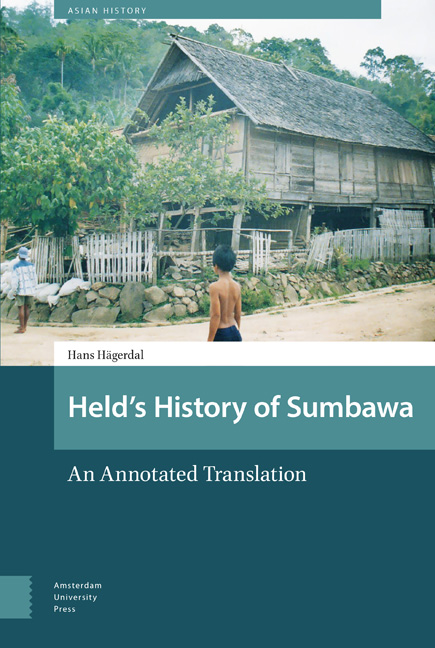Book contents
- Frontmatter
- Contents
- List of Figures and Tables
- Map
- Translator’s Introduction
- 1 The Ancient Period
- 2 Islam and Makassar
- 3 The Sumbawan Kingdoms under VOC Suzerainty (1)
- 4 The Sumbawan Kingdoms under VOC Suzerainty (2)
- 5 In the Wake of the Tambora Disaster
- 6 From Colonial rule to Independence
- Appendix: Lists of Sumbawan Rulers
- Bibliograph
- Index
1 - The Ancient Period
Published online by Cambridge University Press: 10 December 2020
- Frontmatter
- Contents
- List of Figures and Tables
- Map
- Translator’s Introduction
- 1 The Ancient Period
- 2 Islam and Makassar
- 3 The Sumbawan Kingdoms under VOC Suzerainty (1)
- 4 The Sumbawan Kingdoms under VOC Suzerainty (2)
- 5 In the Wake of the Tambora Disaster
- 6 From Colonial rule to Independence
- Appendix: Lists of Sumbawan Rulers
- Bibliograph
- Index
Summary
In the history of Sumbawa we should distinguish between two periods:
I Until 1667, the year when the Bungaya treaty was concluded, when the Island of Sumbawa more or less constituted a closed cultural territory.
II From 1667 to the present, a period of distinct development, where we may consider the year 1815 (the eruption of the volcano Tambora) as the conclusion of the first part, and the period from 1815 until today as the second.
The first period is concluded by the flight of the Sumbawan kings from the defeated Gowa. This is the age when Islam obtained a permanent position and gained an increasing influence on the social development. If we had more information on the pre-Muslim period, there would be every reason to describe the seventeenth century as an age of transition. From the available information one gets some impression about the changes that took place, but no clear picture of the culture before these fundamental changes.
The entire eighteenth century is an age of search for a new political balance, both internally, between the kingdoms on the Island of Sumbawa, and in their relations with Gowa, the Kompeni and the intruding Balinese. In this period [West] Sumbawa lost its influence on Lombok, and Bima on Sumba, and, in spite of repeated attempts of restoration, also on West Flores.
Under the influence of Islam there is a process in the nineteenth century whereby the settlement of the gift exchange system is increasingly completed; by this, the political power of the national government is strengthened. The Tambora disaster in 1815 gives rise to confusion, whereby a more puritan way of life is encouraged. This in turn leads to a decline of the contractual relation between the government of the land and the people.
In the middle of the preceding [nineteenth] century a stronger orthodox-conservative influence appears, one that departs from the religious scholar Abdulgani, of whom we unfortunately know little. This movement, again, leads to a purification of the gift exchange system and a reduction of the dari system, the institution by which the subjects could connect to the political authorities through a network of duties.
- Type
- Chapter
- Information
- Held's History of SumbawaAn Annotated Translation, pp. 29 - 62Publisher: Amsterdam University PressPrint publication year: 2017



